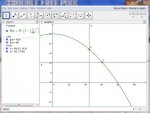1) I recently replaced my pump (just updated signature) and noticed that the clean filter pressure is only 10 PSI as opposed to 12 PSI with the old pump. Does this mean that the flow rate on the new pump is basically only 80% of the flow rate on the old pump? I'll take that trade off, since my old pump used about 1.5 kW,* and the new one says 0.71 kW. If my 80% flow rate assumption is correct, I'll need to run it 25% more time to get the same turnover, but if my 1.5 kW calculation was anywhere close, I'll still be using roughly 35% less electricity! 
2) For a given pump, I assume that flow rate and filter pressure are inversely proportional, but I do not assume that the constant of proportionality is 1--i.e. I assume that GPM=k/PSI , but not that k=1. In other words, when my pressure increases from 10 PSI to 15 PSI (a factor of 3/2), I assume that my flow rate has decreased proportionally, but not necessarily be a factor of 2/3. Does the variation relationship depend on the pump and filter? Any idea of a typical variation equation for flow rate vs filter pressure?
*Power based on rough calculations using my power meter. That info wasn't legible on old pump, and neither was HP.
2) For a given pump, I assume that flow rate and filter pressure are inversely proportional, but I do not assume that the constant of proportionality is 1--i.e. I assume that GPM=k/PSI , but not that k=1. In other words, when my pressure increases from 10 PSI to 15 PSI (a factor of 3/2), I assume that my flow rate has decreased proportionally, but not necessarily be a factor of 2/3. Does the variation relationship depend on the pump and filter? Any idea of a typical variation equation for flow rate vs filter pressure?
*Power based on rough calculations using my power meter. That info wasn't legible on old pump, and neither was HP.




